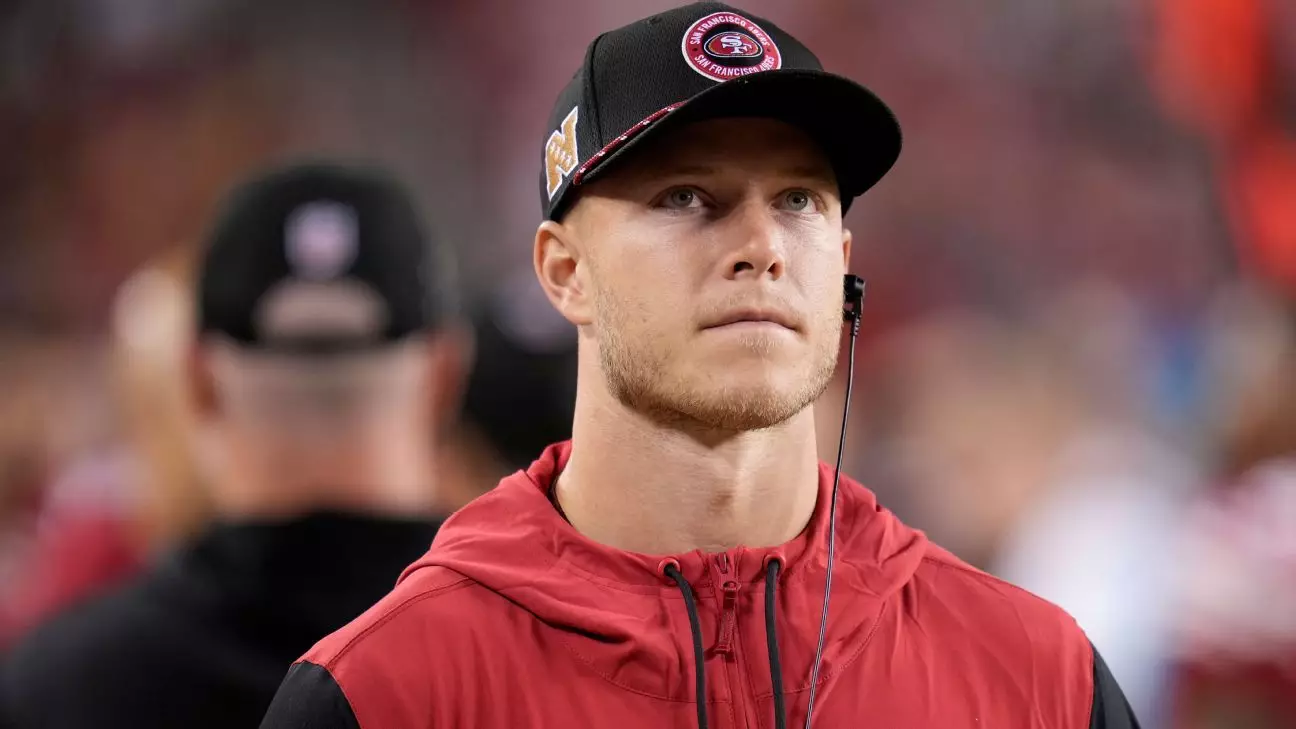The San Francisco 49ers recently made a significant decision to place star running back Christian McCaffrey on injured reserve due to ongoing health issues. This decision, confirmed by ESPN’s Adam Schefter, comes in light of McCaffrey experiencing calf soreness and aggravating Achilles tendinitis. With this placement on IR, McCaffrey must sit out at least four games, including a pivotal matchup against the Minnesota Vikings. This situation not only reaffirms the precarious nature of professional football injuries but also sheds light on the team’s depth in the running back position.
For those less familiar with McCaffrey’s career trajectory, his current injury woes take on an added dimension. Since joining the 49ers via trade in October 2022, McCaffrey had been remarkably durable, missing only one game out of 33—an impressive feat considering his injury-laden past with the Carolina Panthers. Between 2020 and 2021, he was plagued by multiple injuries, limiting him to just ten games in total. This tumultuous period raised questions about his long-term viability as an elite athlete, but the narrative had seemed to shift during his tenure with San Francisco. His current injury reintroduces uncertainty, prompting fans and analysts alike to speculate about its potential long-term effects on both his career and the team’s performance.
Coach Kyle Shanahan’s comments regarding McCaffrey’s health underscore the difficulty of managing injuries in high-stakes situations. The “up and down” nature of McCaffrey’s condition, as described by Shanahan, emphasizes the frustration that comes from a player who occasionally feels fit but is ultimately hampered by nagging pain. By addressing the likelihood of McCaffrey landing on IR, Shanahan indirectly acknowledged the complexity of balancing immediate needs against long-term health. This dynamic often defines life in the NFL, where the pressure to win can sometimes cloud judgment, yet the health of players must remain a priority.
In McCaffrey’s absence, the 49ers will turn to Jordan Mason to shoulder the running back duties. Mason had a breakout performance in his previous game against the New York Jets, racking up career-high figures in carries and rushing yards. This transition period offers Mason an opportunity to solidify his position within the team while contending with the pressure of replacing a player of McCaffrey’s caliber. The team will also look to utilize versatile players like Deebo Samuel, further diversifying their offensive approach during this critical time.
In addition to Mason and Samuel, the 49ers have other options at their disposal. Rookie Isaac Guerendo and veteran Patrick Taylor Jr. are both on the active roster, while Ke’Shawn Vaughn is available on the practice squad. This depth may be critical, especially with the unpredictable nature of an NFL season, where injuries can compound rapidly.
Despite the disappointment of being sidelined, McCaffrey’s mindset remains professionally optimistic. His comments about viewing the situation as a “chess move” reflect a mature understanding of the need for strategic self-care in relation to career longevity. McCaffrey’s commitment to his team’s success and his own recovery is commendable, and fans are hopeful that this hiatus will lead to a swift return—ideally in time for the anticipated game against the Seattle Seahawks.
As McCaffrey navigates this period of healing, it serves as a reminder of the complex interplay between player health, team success, and future prospects. The coming weeks will not only test the 49ers’ depth and resilience but also emphasize the importance of adaptive strategies in the unpredictable landscape of professional football.



Leave a Reply